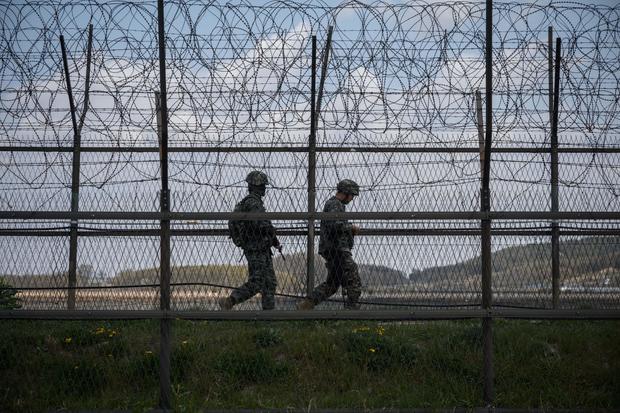Seoul — The South Korean military said on Monday that a man believed to be a North Korean who defected to the South had crossed the border back into North Korea on New Year's Day. The unidentified individual managed to penetrate the heavily armed Demilitarized Zone and get past surveillance equipment along the heavily fortified border near the East Sea coast, the military said.
While many North Koreans have defected to the South over the years, documented cases of people sneaking in the other direction are very rare. The military said the individual was likely a North Korean defector, and various South Korean media reported that it was a former North Korean gymnast who crossed the DMZ from the North by jumping over a fence about 10 feet high late in 2020.
The so-called "Jump Defector" was caught on surveillance video climbing over the fence into the South in November 2020, according to the South Korean military. He has been described as a man in his early 30s who worked as a cleaner after defecting to South Korea. The military said the man caught in new surveillance video, crossing northward on Saturday, bears a resemblance.
Local media say he's believed to have struggled to adapt to his new life in Seoul, but the motivation for his apparent return to North Korea remained unclear on Monday. He was first noticed missing on December 30. After he entered North Korea on New Year's Day, South Korean officials say he was taken away by three North Korean soldiers.
Last year, when a South Korean man illegally crossed into North Korea he was shot to death and his body burned. Analysts speculated that North Korean forces were ordered to take the extreme measure out of fear that the man could spread COVID-19 in North Korea, though it wasn't clear if he had the coronavirus.
Kim Jong Un's 10 years ruling North Korea 02:46Jung Gwang Il, founder the No Chain organization, which helps North Korean defectors settle outside the isolated country, told CBS News that many defectors struggle to adjust to the "highly competitive society" in South Korea and that surprisingly, many end up regretting the decision to leave the so-called "Hermit Kingdom."
The surging popularity of South Korean television and movies, which make their way across the border via illegal bootlegs, has encouraged North Koreans to try to escape into the South in hopes of a better life. But the reality is that very few ordinary people can afford to live like those portrayed on South Korean television. For defectors, who often aren't qualified to seek high-paying, white-collar jobs in the South, the prospects are even grimmer.
North Korean defector-turned-South-Korean-lawmaker Ji Seong-ho wrote Monday on Facebook that many defectors have a hard time, with a majority ending up in the South's lowest income brackets.
"I have a heavy heart hearing that the unidentified person who crossed the border to the North through the Goseong region of Gangwon-do, on the first day of the new year, was revealed by the media that it was a North Korean defector who was economically distressed," said Ji. "According to the 2020 Ministry of Unification statistical data, 25% of North Korean defectors are recipients of basic living security, and 56% of North Korean defectors… are low-income groups."
 South Korean soldiers patrol along a barbed wire fence marking the Demilitarized Zone (DMZ), which separates North and South Korea, on the South Korean island of Ganghwa, April 23, 2020. ED JONES/AFP/Getty
South Korean soldiers patrol along a barbed wire fence marking the Demilitarized Zone (DMZ), which separates North and South Korea, on the South Korean island of Ganghwa, April 23, 2020. ED JONES/AFP/Getty Ryu Hyun-woo, a former North Korean Deputy Ambassador to Kuwait who in 2019 became the highest-ranking North Korean official to defect to South Korea in years, told CBS News that even with their background, he and his wife have struggled to build new lives.
"They said I can find a job if I get a degree in South Korea, but I couldn't even pass the first round," he told CBS News.
Ryu and his wife both graduated from Kim Il Sung University in the North, and he went on to work for the Foreign Ministry while his wife handled finance for the Kim dynasty's mausoleum. They thought their in-depth knowledge of North Korea's economy and society would help land them jobs in South Korea, but South Korean society hasn't welcomed them.
They hope their daughter will be able to study in the U.S., so she can find opportunities that they have never been afforded.
More Download our Free AppFor Breaking News & Analysis Download the Free CBS News app

Post a Comment